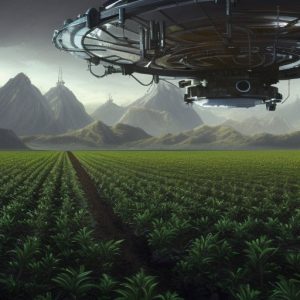
Farming in space? Extraterrestrial agriculture might sound like a pipedream, but as our planet becomes increasingly strained, it could be the key to our survival. With rapid advancements in technology and exploration, the potential for growing food on other planets is no longer just sci-fi fodder. But how do we reimagine agriculture for an alien environment? In this article, we’ll explore the challenges and opportunities of space farming, examine innovative techniques and technologies, and address the ethical considerations of manipulating nature beyond our planet. Is extraterrestrial agriculture the solution to our sustainability crisis? Buckle up and let’s blast off into the future of farming.
I. Introduction
Welcome to the world of extraterrestrial agriculture, where farmers wearing spacesuits cultivate crops under the harsh glare of alien suns. The idea of farming in space might seem unimaginable, but as the pressures on Earth’s resources increase, it’s becoming a realistic option for feeding a burgeoning population. With the rapid advancement in technology, exploration and understanding of outer space, the concept of farming on other planets is no longer the mere romanticized daydream from science fiction novels.

As the predictions of an impending doom for our planet looms, we need to start thinking about alternative means of survival for our species. In the past, humanity has often been the cause of their own undoing. But with extraterrestrial agriculture, we have the chance to prove our resilience, adaptability, and ingenuity.
So how do we go about reimagining agriculture beyond the comfortable confines of Earth? How do we feed ourselves on alien worlds that are thousands of light-years away, in environments vastly different from our own familiar terrain? How do we create technology and tools that will enable us to grow crops and cultivate land in zero-gravity, with an absence of rain, and under different atmospheric conditions?
In this article, we will explore the challenges and opportunities of extraterrestrial farming. We will take an in-depth look at the innovative technologies and techniques that make the survival of humanity on planets other than Earth a feasible proposition. We will also delve into the ethical considerations of reshaping the natural world outside of our planet. So, fasten your seatbelt and make sure your oxygen masks are in place as we prepare for a journey to the frontiers of human endurance and technology.
II. Challenges and Opportunities
Farming in space may seem like a far-fetched idea, but it’s actually full of untold potential. Growing crops on other planets offers a unique opportunity to find a way around the limited resources of our home planet. In addition to mere survival, farming in space can help us to rediscover our sense of adventure, push the boundaries of our knowledge, and renew the pioneer spirit that led explorers to search for new lands in days gone by.

However, let’s not be fooled: space farming is not without its challenges. We must consider the reality that we will be farming in environments that are hostile to our biology, not to mention having to deal with the physical difficulties of growing food in zero-gravity.
One obstacle in space farming is that the environment on other planets is often unforgiving. Colony planets such as Mars are exposed to high amounts of radiation, extreme temperature fluctuations, and low pressure atmospheric conditions. To generate a sustainable growth and produce a fruitful yield, we would have to apply new technologies and build robust infrastructure capable of sustaining life for farmers and crops.
Another challenge of space agriculture is the need for self-sufficiency. Unlike terrestrial farming, where soil, sunlight, and water are readily available, a space farm needs to rely on closed systems for the creation of its resources. With near-zero gravity and little means to exchange energy with an external environment, a sustainable farming system needs to be almost entirely integrative.
The bottom line is: space farming isn’t easy, but neither was any other great endeavor humanity has ever attempted. The benefits are numerous, and the challenges are solvable. We just have to be willing to take up the mantle of the explorer and to confront the unknown with courage and determination.
III. Technologies and Techniques
As strange as it may seem, humans have been farming for thousands of years. From the earliest civilizations in Mesopotamia to the cultivating fields of the Roman Empire, we have been developing our knowledge and techniques to grow food in increasingly challenging environments. But what will it take to grow crops on other planets aside from Earth? What innovative technologies and techniques will be necessary to ensure a bountiful harvest in our cosmic neighbors?

Scientists have already developed many methods to grow plants without soil, which could be critical for extraterrestrial farming. Hydroponics, where nutrient-rich water is cycled through a system that supports vegetation, can be used to grow crops on a small scale, utilizing a recirculating system. And aeroponics, where plant roots are suspended in the air and misted with nutrient solution, provides plants with water and nutrients – this could be the solution for using less water and allowing plants to grow bigger and healthier as water and nutrients are more generously delivered to the roots.
In addition to these methods of growing food in a zero-gravity environment, research is underway to develop plant cultivation strategies that can withstand the harsh conditions of other planets. For example, genetically modified crops that can resist high radiation levels or tolerate extremely cold temperatures could revolutionize agriculture in harsh environments. This is possible with the advances in gene editing technologies including crispr, which allows researchers to cut and alter sections of DNA code – thereby allowing them to create hardy crops resistant to the unique conditions of other worlds.
Furthermore, farming robots equipped with artificial intelligence could be deployed to till and plant crops. With careful programming, these robots could plant, water and harvest crops autonomously, saving time and energy while also freeing up human space workers for other tasks. Likewise, spacecraft equipped with on-board cultivation systems could be used to establish self-sustaining colonies on other worlds.
The future of space farming holds boundless potential, yet we must approach it with caution and wisdom to avoid repeating the mistakes of the past. With innovative technologies and cutting-edge techniques, we can make the impossible possible and ensure the survival and longevity of humanity beyond the limits of our home planet.
IV. Sustainability and Adaptability
One of the primary goals of extraterrestrial agriculture is achieving long-term sustainability. With Earth’s population continuing to grow, we need to create viable, self-sustaining farming practices that can continue indefinitely on other planets. The environments of these lands are challenging, but not insurmountable, and we must adapt and establish self-sufficient communities to thrive for generations.

Creating a self-sustaining environment requires a holistic approach. We need to focus on creating closed cycles of resources, creating a closed system where waste products are recycled and converted into useful resources. Technologies like using wastewater for hydration, nitrogen-fixing plants, and creating ecosystems that are capable of self-regulation can play a critical role in ensuring the survival of farmers in space.
Another aspect of sustainability is ensuring that the necessary resources are available to create a self-sustaining system. We must make sure that we are not taking too much from nature, even on another planet. Uncertainty about the power sources, for example, may require the use of nuclear batteries to provide energy to the farming ecosystem, and we need to make sure that these resources are used conscientiously and efficiently.
Adaptability is also essential to long-term success in extraterrestrial farming. We need to be willing to experiment with new techniques and technologies, as well as different crops, to find what works in a new and untested environment. Furthermore, we need to do our best to harness the knowledge of the indigenous populations of other planets, if any exists, and use local resources to improve quality of life and the success of the agriculture.
V. Ethical Considerations
However, with great power comes great responsibility. As we venture into the unknown territory of extraterrestrial agriculture, we must also consider the ethical implications of our actions. We must address questions around our right to manipulate nature beyond our planet, especially when the long-term consequences are still unknown.

One concern is the possibility of introducing invasive species to other planets, which could threaten the fragile ecosystems and native life forms. We must be mindful of our impact on the environment, and ensure that we do not cause more harm than good. We need to proceed with caution and with a deep understanding of the natural systems that we are interacting with.
Another consideration is the potential for economic exploitation of other planets for our own gain. Would we be perpetuating the same patterns of colonization and exploitation that have characterized human history? Or can we find a way to tread more lightly, building symbiotic relationships with the extraterrestrial environments we inhabit?
Moreover, there are concerns over how extraterrestrial agriculture could exacerbate wealth inequalities both within and between planets. The economic forces that drive agriculture on Earth could easily shape the new extraterrestrial farming systems, leading to a concentration of wealth in the hands of a few. This could lead to severe power imbalance and exploitation of those who cannot participate in the farming process.
These ethical questions can be both perplexing and thought-provoking, requiring deep reflection on our values as a society. As we continue to explore the possibilities of extraterrestrial agriculture, we must remain mindful of our role as custodians, not conquerors, of the universe. We must be guided by our morals and our humanity, and let them guide us as we create a sustainable and equitable future for ourselves and the other forms of life we encounter beyond our planet.
VI. The Future of Agriculture
The bright future of agriculture on other planets holds untold possibilities for the survival of the human race. If we can overcome the daunting challenges of cultivating crops in inhospitable terrain, we can ensure our continued existence even if something disastrous happens to Earth. The lessons learned from farming in space can also have a positive impact on our planet, as we develop more sustainable and eco-friendly practices.

As we push the boundaries of science and technology, it is not difficult to imagine a day when humans have colonized other planets and created self-sustaining ecosystems based on extraterrestrial agriculture. Entirely new foods could be grown that are adapted to different climates and tastes, leading to exciting gastronomic discoveries. The lessons learned from space farming could help us to understand the intricacies of plant growth, revolutionizing the way we farm on Earth.
Moreover, extraterrestrial agriculture could inspire us to rethink our relationship with nature and strive for more sustainable means of living on this planet. By exploring and understanding the limits of what is possible in space, we could gain insights into how life can survive and thrive under conditions that are harsh and seemingly uninhabitable. These lessons can help us to design more eco-friendly methods of farming on Earth, leading to a more balanced and sustainable world that respects the natural environment and promotes the health and well-being of all creatures.
Space farming could pave the way for a new era of sustainable living that is not bound by the limitations of our planet. It could be the catalyst that drives us to innovate and pioneer, creating new solutions to some of the biggest challenges facing humanity today. While the future of extraterrestrial agriculture may seem like the stuff of science fiction, the potential for a brighter tomorrow is very real. If we can master the art of farming in space, we may find that the impossible is within our grasp after all.
VII. Conclusion
As we come to the end of this journey into the world of extraterrestrial agriculture, it’s time to ponder some of the implications of farming beyond the boundaries of Earth. This isn’t just about ensuring our survival as a species on other planets; it’s about our relationship with the cosmos, the universe beyond our blue-green world. How will this new venture of space agriculture shape our understanding of who we are as human beings and our place in the universe?

Undoubtedly, the technology and techniques that we will develop to grow food in space will have far-reaching applications beyond agriculture. These advancements could impact how we approach other challenges on Earth, from solving our energy crisis to mitigating climate change. The sustainability techniques developed for farming in space could also be used to enhance agricultural practices on Earth.
Extraterrestrial agriculture also has the potential to drive international cooperation and collaboration. It will require the efforts of scientists, engineers and policymakers from different parts of the world to develop and implement viable solutions for farming in space. The exploration and colonization of space could bring us closer as a global community, united in our shared objectives of survival, prosperity and adventure.
However, there are also ethical considerations when it comes to reshaping natural environments beyond Earth. We need to ask ourselves whether the alteration of alien ecosystems is justifiable, and what rights we have to do so. Our exploration of the cosmos should be tempered with a sense of humility and respect towards other possible life forms and ecosystems that we may encounter.
Ultimately, the quest to feed ourselves on other planets is a grand undertaking, with profound implications for our future as a species. As we set out on this bold adventure, let us be mindful of the lessons we have learned from our history, of our fallibility and our hubris. May we tread lightly upon the soil of other worlds and strive to create a legacy that future generations will be proud of.






